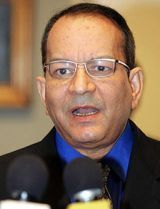UN must back any Darfur peace deal – Chad’s FM
May 2, 2006 (N’DJAMENA) — A peace deal in Sudan’s Darfur region would help stem the flow of rebels and refugees over the border into Chad but must be enforced by a strong U.N. peacekeeping mission, Chad’s foreign minister said on Tuesday.
 Chad is holding an election on Wednesday expected to re-elect President Idriss Deby for a third five-year term.
Chad is holding an election on Wednesday expected to re-elect President Idriss Deby for a third five-year term.
But its security forces are keeping a wary eye on the eastern border with Sudan from where rebels who raided the Chadian capital N’Djamena last month are threatening attacks to disrupt the polls.
Deby accuses neighbour Sudan of backing his rebel opponents from Darfur, where ethnic and political conflict has raged since 2003 but the U.S. government put pressure on Tuesday on the warring Darfur parties to strike a peace deal.
Chadian Foreign Minister Ahmat Allam-Mi said an accord would improve security for his country, which houses more than 200,000 Darfur refugees.
“We want peace in Darfur, first of all for ourselves, for the interests of Chad and our people,” he told Reuters in an interview in N’Djamena.
“Once peace has been restored in Darfur, you can be sure that the immediate consequence will be peace on Chad’s frontiers,” he added.
Although Khartoum denies helping the anti-Deby rebels, Deby accuses Sudan’s Arab government of trying to “export” the conflict in Darfur to extend Islamic fundamentalism to Sub-Saharan Africa.
“Sudan will not stop attacking us as long as the crisis in Darfur is not resolved,” Allam-Mi said.
He repeated a call by Deby this year for the U.N. to impose peace and strengthen and take over an African Union peacekeeping force in Darfur, where tens of thousands have been killed and more than 2 million forced from their homes since 2003.
“The execution of a peace deal cannot be carried out without the support of U.N. forces,” the Chadian minister said.
RISK FOR REFUGEES
The government of Sudan has accepted a draft peace settlement on Darfur proposed by AU mediators at talks in the Nigerian capital Abuja. But two Darfur rebel groups have so far refused to sign, insisting their key demands be met in full.
U.S. Deputy Secretary of State Robert Zoellick flew to Abuja on Tuesday to try to secure a final peace deal by a midnight deadline.
Following the April 13 attack by anti-Deby rebels on N’Djamena, Chad broke diplomatic ties with Sudan and warned the world that without peace in Darfur it might not be able to carry on sheltering the Sudanese refugees in eastern camps.
“The key to the problem is Khartoum. We’re just the victims here,” Allam-Mi said.
He said a U.N.-enforced peace in Darfur would allow the voluntary repatriation of Sudanese refugees from Chad.
Deby’s own government has been accused by Sudan of supporting some of the Darfur rebels who took up arms in early 2003 in the ethnically-mixed region over what they saw as neglect by Khartoum’s Arab-dominated central government.
In a Libyan-brokered accord signed in Tripoli in February, Chad and Sudan agreed not to allow their territories be used by rebels opposed to their respective governments. But N’Djamena says Khartoum has violated the agreement.
Chad’s government is going ahead with Wednesday’s presidential poll despite the threat of rebel attacks and a boycott by hardline opposition parties which say the vote is a one-sided farce aimed at extending Deby’s nearly 16-year rule.
Deby is offering opponents a post-election dialogue, including a possible amnesty for rebels if they accept the result of the poll analysts say he looks certain to win.
(Reuters)
